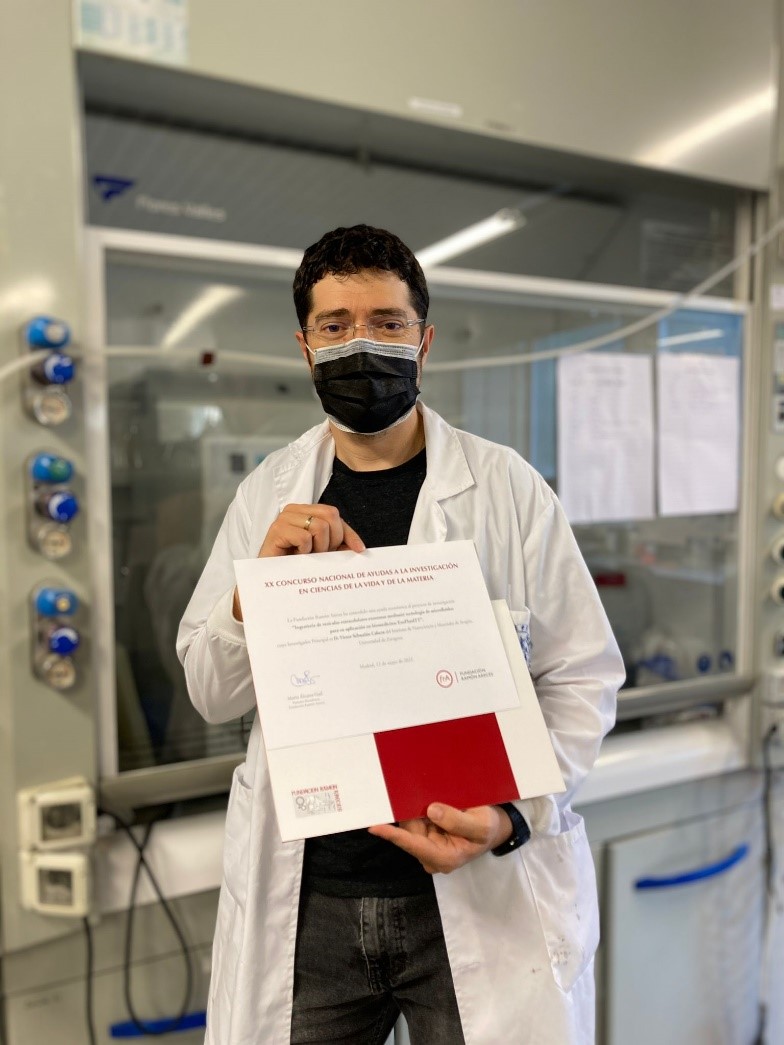New project ExofluidTT for the production of nanovesicles using microfluidics applicable on Biomedicine
Víctor Sebastián Cabeza, researcher of NANBIOSIS U9 Synthesis of Nanoparticles of CIBER-BBN and the Institute of Nanoscience and Materials of Aragón, INMA, has obtained a research grant in the XX National Contest of the Ramón Areces Foundation in the category of Life and Matter Sciences with a funding of € 112,000 for the development in 3 years of nanovesicles using microfluidic technology.
As explained by Victor Sebastian “the characterization of the nanovesicles will be carried with the equiment and expertise of NANBIOSIS Unit 9
The project entitled “Engineering of extracellular vesicles-exosomes using microfluidic technology for its application in biomedicine: ExoFluidTT” aims to develop new procedures to improve the selectivity and efficiency of therapeutic treatments, such as, for example, cancer. The nanocarriers considered in ExoFluidTT are called exosomes and are nano-sized extracellular vesicles, produced by the patient’s own cells and whose structure and composition is so complex that their production by synthetic procedures is not possible. The application of these vesicles is creating a revolution in cellular treatments, since they allow to face the problems in which artificial nanocarriers fail. However, its clinical use is complex, due to the difficulty of its production, isolation and reconfiguration for the treatment of diseases.
The ExoFLuidTT project aims to design an innovative platform based on the use of exosomes for its application in targeted therapies. The basis of this innovative platform is based on the use of microfluidic technology to obtain the exosomes of the patient’s cells. These exosomes would be isolated for their reconfiguration aimed at obtaining nanocarriers that allow the administration of drugs in a targeted manner. This microfluidic technology consists of a complex system of pipes and micrometric-scale reactors (similar to the dimensions of a human hair) that mimic the highly efficient network of blood capillaries that the human body has, so that, in an efficient way, they can be manipulate volumes of fluid on the scale of picoliters (one millionth of a drop).
This project is based on the previous experience of Víctor Sebastián Cabeza in the development of microfluidic technology for multiple uses in Catalysis, Materials Engineering and Nanobiomedicine, as well as the experience of his work team, ExoFLuidTT, in the use of exosomes as therapeutic nanocarriers. This team has recently published a study where they were able to successfully develop exosomes modified with palladium nanosheets for the selective activation of prodrugs in-vitro and to treat tumor cells selectively. The results of this work were published in the prestigious journals Nature Catalysis and Nature Protocols and open a therapeutic pathway that can have a great social impact.
The project work team, led by Víctor Sebastián, is made up of CIBER-BBN researchers Manuel Arruebo and Jesús Santamaría, all of them professors from the Department of Chemical Engineering and Environmental Technologies at UNIZAR, and researchers from INMA and IISAragón . Researchers Silvia Irusta (INMA / CiberBBN / IIS Aragón) and Pilar Martín Duque (ARAID / IACS / IISAragón) collaborate with this team.









